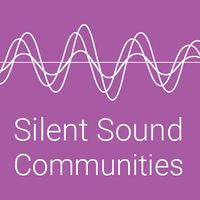Silent Sound Communities: Difference between revisions
No edit summary |
No edit summary |
||
| (10 intermediate revisions by 2 users not shown) | |||
| Line 1: | Line 1: | ||
[[File:Silent_sound_communities_.jpg]] | |||
{{Project | {{Project | ||
|acronym= | |acronym=Ssc | ||
|logo= | |logo=SSC-02_FB.jpg | ||
|project_title= | |project_title=Silent Sound Communities | ||
|contract_number= | |contract_number= | ||
|funding_period= | |funding_period= | ||
|coordinator= | |coordinator= [[Eliza Danenfelde Kirpe]] | ||
|funding_agency= | |funding_agency= | ||
|total_cost= | |total_cost= | ||
|partners= | |partners= | ||
|website= | |website=https://www.facebook.com/SilentSoundCommunities/ | ||
}} | }} | ||
The '''Silent Sound Communities''' is a project envisioned and originally designed by [[Eliza Danenfelde Kirpe]]. The concept has evolved into a social enterprise, which is now seeking support as a startup. | |||
Music connects people irrespective of language, culture or religion. Our "Silent Sound Communities" project aspires to connect different peoples of Cyprus, and especially Greek and Turkish Cypriots. Our innovation, however, is that we will use senses beyond hearing, to "listen" to the music, and to "dance" with the rhythm! Scientists have shown that music can be "heard" through all our body using specially designed vibrating suits. This is how deaf people can "hear." In our project, we start with deaf communities, and then engage all people in theoretical and practical workshops: | |||
The practical part consists of workshops, educational modules, events etc. and toolkits to show different ways, methods of feeling music through our body and with help of new technologies. In this way we would promote social inclusion between deaf community and the rest of society, as well as social inclusion and understanding between Greek Cypriot and Turkish Cypriot communities. | |||
The theoretical part involves what we call peoples' science and research. We will engage deaf, as well as perfectly hearing individuals (mixed from different communities for each "experiment") to research activities in which we "test" their ability to dance following the rhythm which is sensed through the vibrating suits as well as their ability to recognize rhythms that are played by looking at people dancing following those rhythms. | |||
==Info materials== | |||
===Video=== | |||
[[Category:High-tech Companies]] | [[Category:High-tech Companies]] | ||
[[Category: | [[Category:Startup Companies]] | ||
Latest revision as of 00:05, 4 July 2018
|
The Silent Sound Communities is a project envisioned and originally designed by Eliza Danenfelde Kirpe. The concept has evolved into a social enterprise, which is now seeking support as a startup.
Music connects people irrespective of language, culture or religion. Our "Silent Sound Communities" project aspires to connect different peoples of Cyprus, and especially Greek and Turkish Cypriots. Our innovation, however, is that we will use senses beyond hearing, to "listen" to the music, and to "dance" with the rhythm! Scientists have shown that music can be "heard" through all our body using specially designed vibrating suits. This is how deaf people can "hear." In our project, we start with deaf communities, and then engage all people in theoretical and practical workshops:
The practical part consists of workshops, educational modules, events etc. and toolkits to show different ways, methods of feeling music through our body and with help of new technologies. In this way we would promote social inclusion between deaf community and the rest of society, as well as social inclusion and understanding between Greek Cypriot and Turkish Cypriot communities.
The theoretical part involves what we call peoples' science and research. We will engage deaf, as well as perfectly hearing individuals (mixed from different communities for each "experiment") to research activities in which we "test" their ability to dance following the rhythm which is sensed through the vibrating suits as well as their ability to recognize rhythms that are played by looking at people dancing following those rhythms.

